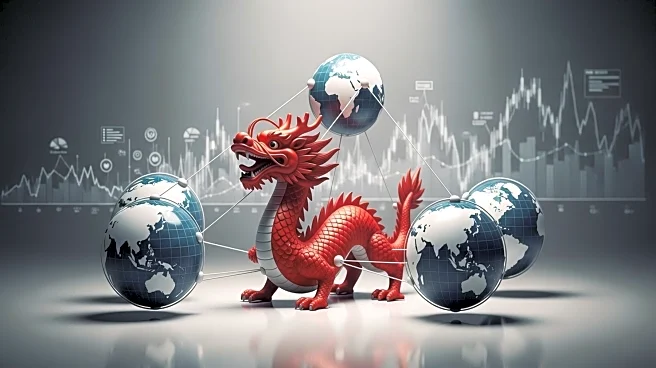What is the story about?
What's Happening?
China's economic performance in August showed signs of a slowdown, with key indicators such as retail sales and industrial output missing expectations. Retail sales increased by 3.4% compared to the previous year, falling short of the anticipated 3.9% growth. Industrial output growth also slowed to 5.2%, marking its weakest level since August 2024. Fixed-asset investment expanded by only 0.5%, a significant drop from the 1.6% growth seen earlier in the year. The contraction in real estate investment worsened, declining by 12.9% over the first eight months. Despite these challenges, investments in manufacturing and utilities saw some growth, driven by state-owned enterprises. The urban unemployment rate edged higher to 5.3%, attributed to the graduation season. The National Bureau of Statistics highlighted the presence of multiple risks and challenges in the external environment, emphasizing the need for stable economic policies.
Why It's Important?
The slowdown in China's economy has significant implications for global markets, particularly for countries like the U.S. that are closely tied to China's economic activities. A weaker Chinese economy can lead to reduced demand for U.S. exports, affecting American businesses and potentially leading to slower economic growth domestically. Additionally, the uncertainty in China's economic policies and the potential for inflation in imported goods could impact global supply chains and pricing strategies. The shift in consumer spending towards services, such as travel and leisure, indicates changing consumption patterns that could influence international trade dynamics.
What's Next?
China's economic trajectory will be closely monitored by global investors and policymakers. The potential for incremental and targeted easing measures in the coming quarters could stabilize consumption growth. However, a large stimulus package from Beijing is unlikely unless the economy risks missing its 5% growth target. The mainland's CSI 300 index showed resilience, advancing nearly 1% after the economic data release, suggesting that markets had anticipated the slowdown. Future fiscal policies may become more supportive, but the extent of their impact remains uncertain.
Beyond the Headlines
The economic slowdown in China may lead to broader shifts in global economic strategies, as countries reassess their reliance on Chinese markets. The focus on 'anti-involution' policies targeting excessive competition and price wars could influence global manufacturing practices. Additionally, the rise in service consumption highlights a potential long-term shift in consumer behavior, which could affect international tourism and service industries.
















